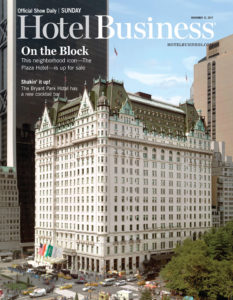 Attorney Todd Soloway, a partner at New York City-based Pryor Cashman LLP, is chair of the firm’s hospitality practice. The veteran litigator is a noted legal representative and counselor who has assisted numerous hoteliers and industry players both in the United States and internationally on a variety of legal fronts over the past decade. An author of articles on issues of importance to the lodging industry, Soloway’s purview also includes corporate deal-making, negotiation of management and franchise agreements and labor and employment matters.
Attorney Todd Soloway, a partner at New York City-based Pryor Cashman LLP, is chair of the firm’s hospitality practice. The veteran litigator is a noted legal representative and counselor who has assisted numerous hoteliers and industry players both in the United States and internationally on a variety of legal fronts over the past decade. An author of articles on issues of importance to the lodging industry, Soloway’s purview also includes corporate deal-making, negotiation of management and franchise agreements and labor and employment matters.
Soloway also serves on the company’s executive committee, heads the real estate litigation practice and is a member of the firm’s litigation and real estate groups.
Pryor Cashman has a long-standing reputation across a wide variety of practice areas and industries. What was the vision behind creating a hotel and hospitality practice, and why is helming that practice appealing to you? At Pryor Cashman, we pride ourselves on the entrepreneurial spirit that is embedded in the DNA of the firm. And the hospitality industry meshes perfectly with our culture. On a personal level, I have always been drawn to the practice areas where business and law intersect. And I pride myself—as does our hospitality group—on sound business judgment rooted in the philosophy that we are intently focused on helping our clients achieve their business goals through our legal representation. That is our unwavering vision, and I am convinced that the expansion of our presence as go-to attorneys in the industry is due to the fact that our clients appreciate and recognize our business-minded approach.
From your perspective, are hoteliers more or less litigious than other groups? I am not certain that they are any more or less litigious, but there are inherent issues in the relationships and the ongoing business concerns in the industry that lend themselves to dispute-resolution processes—both because of the sheer number of contractual relationships spun off of every hotel, the nature of the relationships between the parties, and because of the substance of the standard contracts employed. Frequently, owners are entrusting operators with substantial subjective discretion to run the owner’s hotel; the parties frequently have substantial sums invested and owners want to see return on that investment; and there are a veritable plethora of decisions to be made on a daily, weekly, monthly and annual basis that can become the subject of disagreement. This is fertile terrain for litigation.
Do you think the issues that face the hospitality industry have changed significantly over the past five or so years? Yes, in large measure because the forces driving the issues have changed. Most recently, the merger between Starwood and Marriott has triggered a host of issues, including renewed focus on how operators can honor their fiduciary and contractual obligations while simultaneously serving so many different owners—and frequently in the same market. It also has triggered disputes relating to areas of protection (AOP) clauses and labor union organizing—and it also is setting off a wave of mergers with many more to come, in my opinion.
In addition, Airbnb has contributed another layer of complexity to the market. Hotel owners are suffering at the hands of Airbnb’s hotel-by-another-name business model. And municipalities across the country are working to address the myriad issues that home sharing brings with it. These include, among other things, insurance coverage, housing shortages, violations of local ordinances, tax collection and serious safety concerns. These issues, I believe, will continue to unfold over the coming years.
The industry has had an extended period of profitable returns. What sort of activity have you been seeing in terms of demand for the practice’s services beyond a court action? We’ve seen strong demand for our corporate services with a focus on mergers and acquisitions. No doubt there will be more mergers as the market attempts to scale up to meet the growing market share of Marriott and Accor. And with the seemingly unending parade of new brands every year, we are seeing a lot of activity in negotiating management and franchise agreements, often in conjunction with significant development projects.
Has the proliferation of new/emerging brands created any significant legal issues for owners/operators? The most prevalent issues in dealing with new brands revolved around the supposed “standards” imposed by the brand; potential violations of AOP clauses; and whether these new brands have the personnel bench strength to perform up to the levels required. From both the owner’s and brand’s perspective, whenever a new brand is involved with a development or repositioning of a property, the parties need to know as precisely as possible the scope of the development standards, the costs of achieving those standards and, most important, if the standards are met, will the revenue justify the expenditure? Too often, that equation is figured out on the fly—and then it’s too late.
Substantively, we have seen a number of instances where the brand looks exciting on the surface, but does not have the personnel to carry out the job. This can lead to issues where owners feel that the brand is not meeting its contractual obligations through inadequate sales and marketing strategies, poor revenue management and reservation systems, extensive use of OTAs—all of which can have a negative impact on the bottom line.
Are there particular outside influencers you see creating churn on the legal front for the hospitality industry? What’s your best advice on how to cope with all of this? Clearly, Airbnb, VRBO and the rest of the home-sharing businesses are disrupting the ordinary course of business. If owners and brands do not act aggressively to curtail illegal competition, then they should be prepared to suffer the consequences. There is very little doubt in this lawyer’s mind that Airbnb’s operations in New York City violate local law, but the question that remains is: Who will take them on?
With the advent of massive technology comes exposure for data-breach liability. All of the players are working through how to shift the risks of that liability through the relevant contracts and insurance coverage. I am sure these issues will continue to unfold as the case law and contract negotiations catch up with the times. HB

